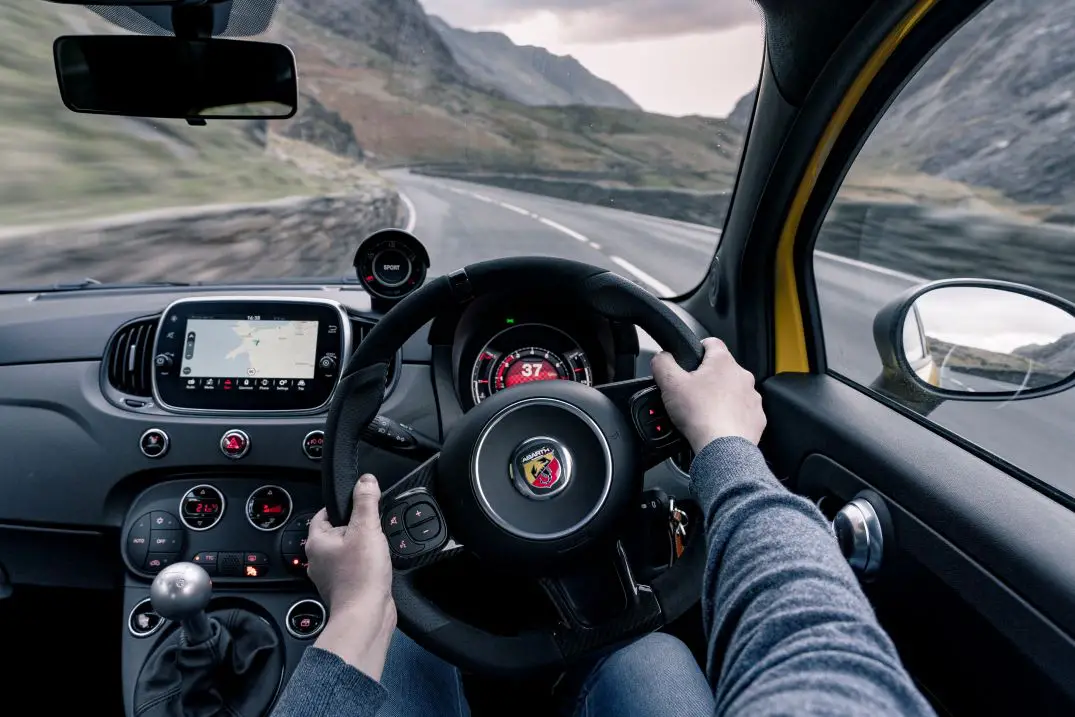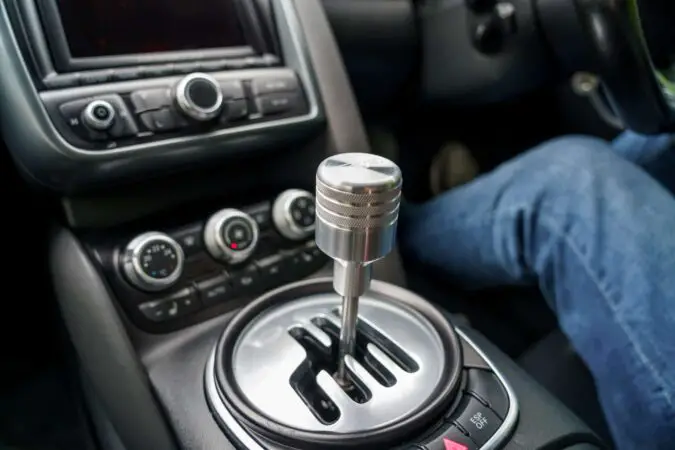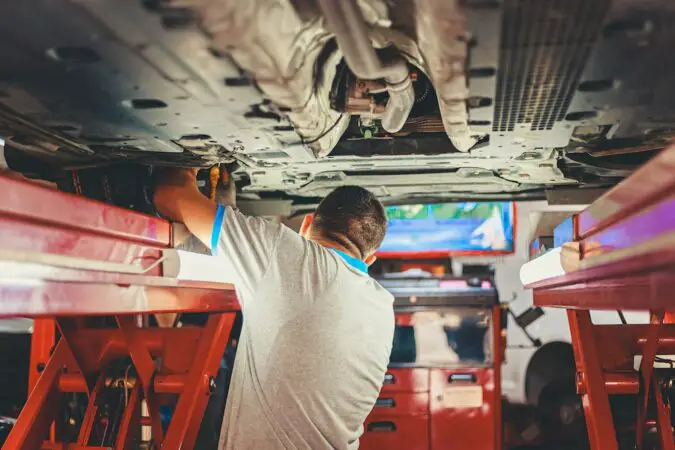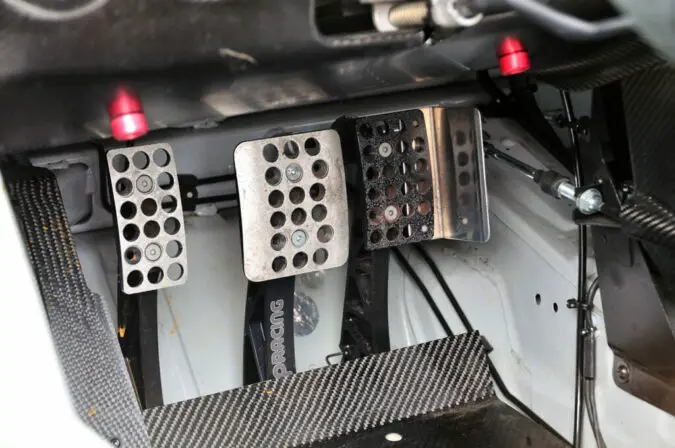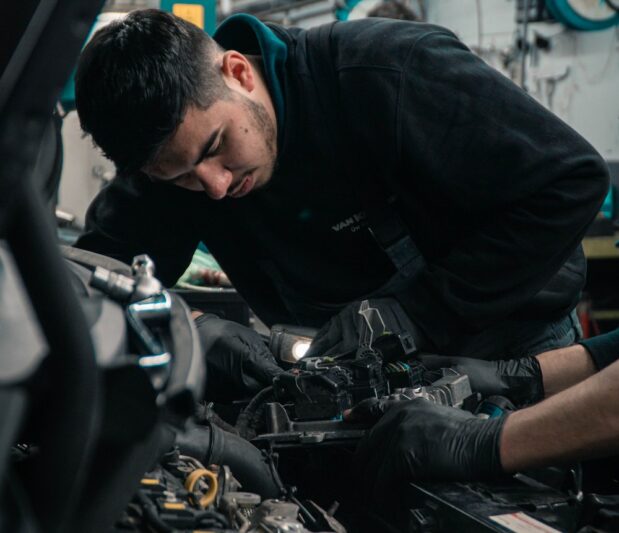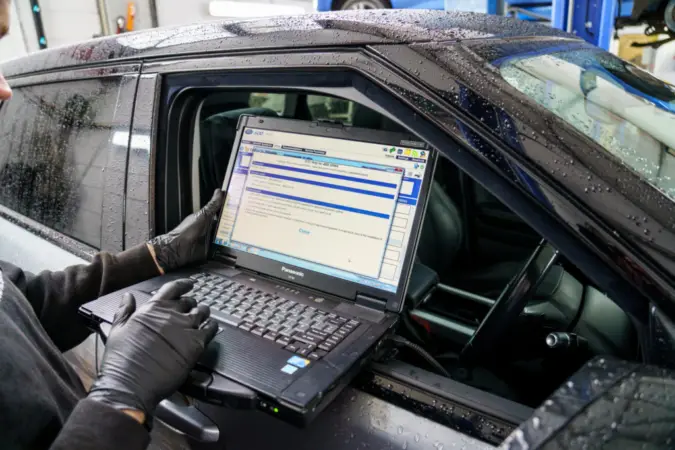Are you facing the problem, “car won’t accelerate but RPMs go up”? It can lead you to be extremely frustrated, irritated, and a little scared for your car. It can be extremely problematic, especially while overtaking someone on the road. Alongside that, it can also be extremely dangerous for the driver and other vehicles out there. There are a number of potential reasons for this problem and we are here to educate you about them.
The reason why your car won’t accelerate but RPMs go up can be due to several problems. Some relate to malfunctioning or problems with the fuel system, the transmission, or the engine. A faulty oxygen sensor might also be the reason for a problem with the engine, which could lead to a loss of power. The governor can also cause this problem as they are responsible for limiting the speed of a vehicle.
These are just some of the problems that can cause the problem “car won’t accelerate but RPMs go up”. Here is everything you need to know about this problem and how to fix it.
What Is RPM
The full form of RPM is rotations per minute. RPMs are a measure of the number of times an engine crankshaft can rotate in a minute. The RPM gauge on the instrument cluster of your car tells you how fast this engine crankshaft is rotating at any given moment. RPM is important for several reasons.
The first reason for RPM being important is the fact that it informs the driver exactly how many rotations the crankshaft is making. The more rotations it makes in a minute the more power the engine produces.
Power and rotations are co-related. Secondly, the RPM of a vehicle also affects the car’s gear ratio. Each car has a certain number of gears, and each of these gears has a different ratio between the engine speed and the wheel speed. You can find out more in our write-up on the P0730 code.
The lower gears always have a higher ratio. This means that the engine speed is higher when compared to or in relation to the wheel’s speed. This is the reason why your car can accelerate faster when it comes to lower gears. On the other hand, higher gears have a lower ratio. This means that the engine speed is slower than the wheel speed. This is why your car goes faster in higher gears.
The last point on the list of why RPM is important is the fact that it affects your car’s fuel economy. The faster the engine crankshaft runs the more fuel it burns. That is the reason why you get better fuel economy at lower speeds and higher gears.
What’s Causing It
There are a number of reasons why your vehicle would not accelerate even though the RPMs go up. This problem can be extremely frustrating and can be a source of concern for the owner of the vehicle. If you’re experiencing this problem, you need to keep an eye out for these issues.
Car Won’t Accelerate But RPMs Go Up, Causes #1: Low Transmission Fluid
The most common cause of the problem, “car won’t accelerate but RPMs go up” is the fact that the transmission fluid level on your vehicle is low. The job of the transmission fluid is to make sure and help the transmission transfer the power to the engine of the vehicle. So when the transmission fluid is running low that might be the culprit behind this problem.
The power will only be able to transfer through the torque converter and not the engine. This is especially the case when the transmission fluid is low. In order to get over this problem, you need to quickly check the transmission fluid and get your car checked out as soon as possible.
Car Won’t Accelerate But RPMs Go Up, Causes #2: Worn Clutch Disc
Another point of cause for this problem is the fact that your clutch disc might have worn out or gone bad. Clutch plates are usually present in manual transmission. The manual transmission has become rarer and rarer by the day. Hence, a lot of people do not have the right information regarding manual transmissions in general.
A faulty clutch hence causes your car not to accelerate, even though the RPMs go up. In a manual transmission, the clutch links the transmission, through the input shaft and the engine through the flywheel.
When the clutch starts to wear out the clutch becomes unable to hold the gear anymore. It starts to slip off and it starts to lose its grip on the flywheel. It feels like the clutch is still engaged and the pedal will feel extremely light and loose.
This is a common occurrence at a high speed and under some great acceleration. It gets worse alongside the clutch slips, and burnouts and can handle only a certain amount of torque.
Car Won’t Accelerate But RPMs Go Up, Causes #3: Bad Torque Converter
Another problem that adds to the list of “car won’t accelerate but RPMs go up”, is the fact that you might be dealing with a bad torque converter. The responsibility of the torque converter is to convert the mechanical power produced by an engine into hydraulic power.
Hence when your car is dealing with a broken or malfunctioning it can no longer do its job properly. This would not allow the power to reach the transmission. Hence even though your RPMs might be increasing, your speed is not.
Car Won’t Accelerate But RPMs Go Up, Causes #4: Drivetrain Not Connected To The Wheels
The problem, “ car won’t accelerate but RPMs go up” has several causes and one of them is a broken axle shaft. A broken axle shaft will be the reason why the transmission can not properly turn the wheels of your car. This will cause your car to face a problem where the car won’t accelerate but RPMs go up. You won’t feel even the slightest car jerk as you put it into gear but this might still be the root cause of this problem.
Car Won’t Accelerate But RPMs Go Up, Causes #5: Mass Air Flow Sensor Failure
One of the main responsibilities of the mass airflow sensor is extremely self-explanatory. Hence that means that it is used to measure the amount of air that enters through the air intake. The mass airflow sensor is usually placed or attached to the air intake cleaner in most vehicles.
A clogged or malfunctioning mass airflow sensor can send a wrong signal to the ECU making the car not accelerate. This happens due to the lack of air in the combustion chamber. This can be the reason why your car is facing the problem,” car won’t accelerate but RPMs go up”. So, be wary of the symptoms of a bad mass air flow sensor.
Car Won’t Accelerate But RPMs Go Up, Causes #6: Malfunctioning TPS
The full form of TPS is a throttle position sensor. The main responsibility of the throttle position sensor is to detect the angle at which the throttle valve needs to be opened up to. So in layman’s terms, it is used for detecting how much pressure you have put or induced on your vehicle’s accelerator.
If it is your throttle position sensor (aka the throttle body sensor) that is malfunctioning or has gone bad, it would not be able to give the correct information to the vehicle’s ECU about the position of the throttle body and thus your vehicle will end up losing a lot of power.
Car Won’t Accelerate But RPMs Go Up, Causes #7: Clogged Fuel Filter
Another cause of the problem,” car won’t accelerate but RPMs go up” is that the fuel filter on your car can get clogged. A clogged fuel filter can be another reason why your car would not accelerate. Usually, the responsibility of a fuel filter is to prevent anything other than fuel to pass through and go into the engine.
The fuel filter traps several tiny particles like dirt, gunk, or any time of sediment. Because of that, it might clog the fuel filter and it would not be able to send the required fuel to the engine. Eventually, the engine would not be able to produce any power and cause the car not to accelerate. Hence you need to check your fuel filter for dirt or gunk if you’re facing this problem.
Car Won’t Accelerate But RPMs Go Up, Causes #8: Incorrect Air-Fuel Ratio
All of these other causes are connected or related to the transmission, so once you have checked that properly you need to move towards the engine. If the problem of the inability to accelerate still continues might be due to an intake system or a fuel injection system (you can learn more in our guide on what do fuel injectors do). They directly affect the air-fuel ratio of your vehicle.
For the combustion process to occur properly, the engine cylinders need to receive the right mixture of air and fuel ratio. If the mass flow sensor or the air filters are not working properly, the engine will not receive adequate air for the combustion chamber to operate in an optimum way.
On the other hand, even if your fuel pump or the fuel injectors are malfunctioning, the engine would not get enough gas again stopping the car to work in an optimum condition. So this might be the cause why your car won’t accelerate but RPMs still go up.
Car Won’t Accelerate But RPMs Go Up, Causes #9: Bad Throttle Body
The cars that are produced in today’s day and age use the help of a computer to control the amount of fuel that is released into the engine. This information is usually based on how much acceleration you are giving and the tuning done to the car.
In layman’s terms, you can put it in such a way that how much you press on the gas is responsible for determining the amount of fuel that enters into the engine. The gas pedal controls the throttle body. That is responsible for determining the air that goes into the engine.
To open more throttle valves, you must add more pressure on the gas pedal. This will allow more oxygen to engine the engine alongside the fuel for optimum combustion.
Hence, if your car’s throttle body is faulty or dirty due to some dirt or sediments, it can be the reason why your car will be having the problem, “car won’t accelerate but RPMs go up”.
Car Won’t Accelerate But RPMs Go Up, Causes #10: Malfunctioning Engine Control Module
All of these problems that are listed above usually help you diagnose the problem, “car won’t accelerate but RPMs go up”. But if none of these work, the last option you need to check is the ECU or the engine control module. You need to show your vehicle to a technician to look at the ECU.
Since most modern cars have an ECU controlling most of the things relating to your engine, a malfunction in the ECU can be the culprit for this problem. The ECU might need to be upgraded, changed, or reset. A good technician will know what to do with a broken or malfunctioning ECU.
Conclusion
The problem, “car won’t accelerate but RPMs go up” can be extremely problematic and can cause a sense of panic for the owners facing this issue. The problems listed above are some of the most common causes of this problem. But there are several uncommon issues as well. So the best thing you can do is prepare yourself as much as you can to face this problem.
Frequently Asked Questions
Here is a list of most of the common questions or doubts people have while facing the problem, “car won’t accelerate but RPMs go up”. These questions and answers might help clear any doubts or problems you might be facing.
Why Won’t My Car Accelerate
A poorly performing engine can be the result of an engine that runs lean because of not enough fuel. Similarly, a lack of airflow can also prevent the engine from accelerating in its optimum condition. Some of the most common issues for this problem are related to fuel and air delivery. They can be related to a malfunctioning fuel pump or fuel injectors. There are several causes for your car facing a problem of poor acceleration or running lean. There are a number of reasons why this might be happening and most of them are listed above in the article.
Is It Bad To Rev Your Engine
The revving of an engine has been something that is extremely close to the hearts of automotive enthusiasts. So it is normal to think about whether or not revving your car is damaging your vehicle. When you rev your engine, you are putting additional and unnecessary stress and pressure on your car. This is extremely important to know not to rev your engine especially when it is cold outside or if the engine has not warmed up. A cold engine rev can be extremely damaging to the car. A cold start means that the engine oil has not had sufficient time to circulate and it can not correctly lubricate your combustion chamber. So revving the engine car damages the internals of the engine.
What Makes A Car Fast
Every automotive enthusiast out there wants a fast car, or is working on getting new parts to make their vehicles faster. There are a number of things that can make your car faster. Here are just some of the things you can do to make your car faster. In terms of acceleration, torque plays a huge role in how quickly a car can accelerate. This is because torque usually signifies how fast a car can accelerate from a standstill point or from a constant speed. A quick vehicle can generate high levels of torque force at a relatively low speed. This allows the vehicle to accelerate quickly. But in order to make your car fast, you need the correct ratio of torque as well as horsepower. Horsepower signifies the overall speed and power that is produced by an engine.
What Are RPMs
RPM stands for rotations per minute. RPM helps to signify the acceleration of the vehicle. They are used to measure the number of times an engine crankshaft rotates within one minute. The RPM gauge on the instrument cluster of your vehicle can tell you how fast the engine crankshaft is rotating at any given moment. There are a number of reasons why RPM is important. One of them is the fact that it notifies the driver about the number of rotations made by the crankshaft in a minute. It also helps to get better fuel economy as high RPMs mean that more fuel is used while on the other hand, while low RPMs are good for better fuel economy.
Why Does My RPM Go Up And Down While Parked
If your vehicle is facing the problem where the RPMs are going up and down, it comes under the category of an inconsistent idle. The underlying fault may exist at a higher engine speed but it is usually masked at those high speeds. Among the causes of this problem are vacuum leaks, EGR system malfunctions, malfunctioning oxygen sensors, bad fuel injectors, bad spark plugs, a malfunctioning mass airflow sensor, or a bad throttle body sensor. The root cause of this problem can be pinpointed and the required repairs can be made, especially if you request engine diagnostics. If you have further questions or doubts you need to show your vehicle to a mechanic for better insight into the problem. It is important to make sure that your vehicle is fixed within a reasonable cost and the repairs show the best results.
Is The Transmission Part Of The Engine
This is a common misconception that the transmission is a part of the engine. They are definitely correlated but the transmission is definitely not a part of the engine. They are two different parts, and these units have their own function that differentiates them from each other. Even though they are different both of them are essential to the power of your vehicle. The engine is responsible for providing power to the vehicle while the transmission manages the output of the engine as well as the driving conditions. The engine is the heart of the engine that helps move the vehicle on the road. It also helps to power the various accessories that come with the engine. The main function of the engine is to convert the chemical energy extracted from various fuels into mechanical energy to move the crankshaft.
Why Does My Car Go Into Gear But Not Move
Usually, if you are facing a problem where you put your vehicle into gear but the car does not move, it can be extremely stressful. This problem can originate from malfunctioning parts like the car’s clutch, faulty or bad synchronizer ring, or the subpar transmission fluid due to the shifter cable, shift, or a leak in the transmission. Besides engine or transmission problems that are listed above, problems like rainwater or cold or snow can also be the cause of the gears not to be working.
What Should RPM Be When Starting Car
All the cars that are available on the market do not start at the same RPM. The RPM usually depends upon the type of engine and the power it produces. If your engine size is about 2.0 liters, the RPM it should be starting on is anywhere between 500 to 800 RPMs. if the size of the engine is bigger than that, the RPMs should sit anywhere between 550 to 750 rotations per minute. If your RPM starts anywhere between 600 to 1000, you have nothing to worry about and it means that your engine is working properly. Depending on the conditions your car is surrounded by, your car can also have different RPMs when it starts. For example, during cold weather, your car’s RPM usually starts at a higher than normal RPM. This rate drops as your car warms up to the optimal engine temperature.
Is It Bad To Redline Your Car
Riding your car can be extremely fun, especially on a track where you can push it to the limits, red-line shift your car, and just have fun. Even though it is fun to push your car to the limits, consistently redlining your car can cause serious damage. The damage is not limited to your tires, but also your engine. Manual transmission cars can be extremely easy to redline and eventually cause your engine to wear down your engine prematurely.

